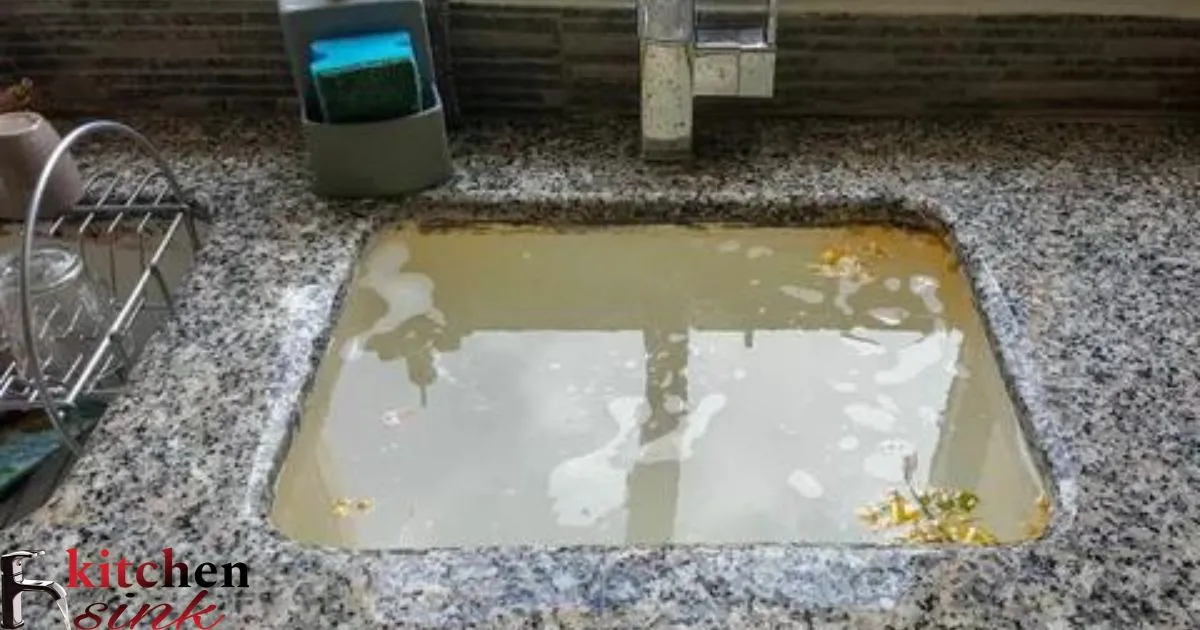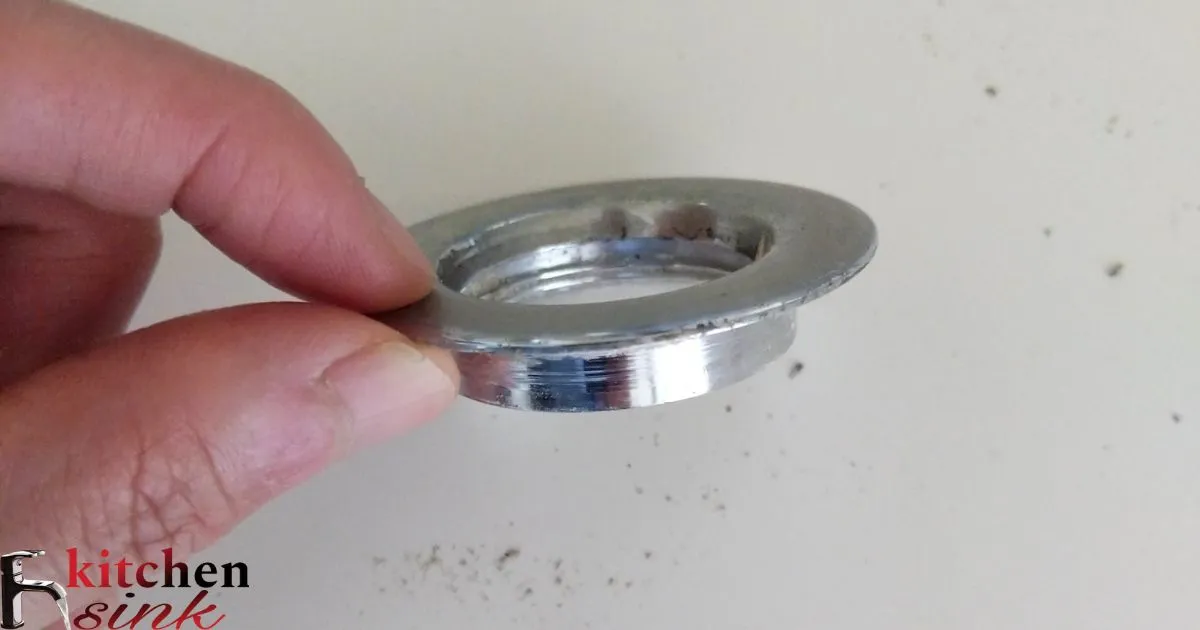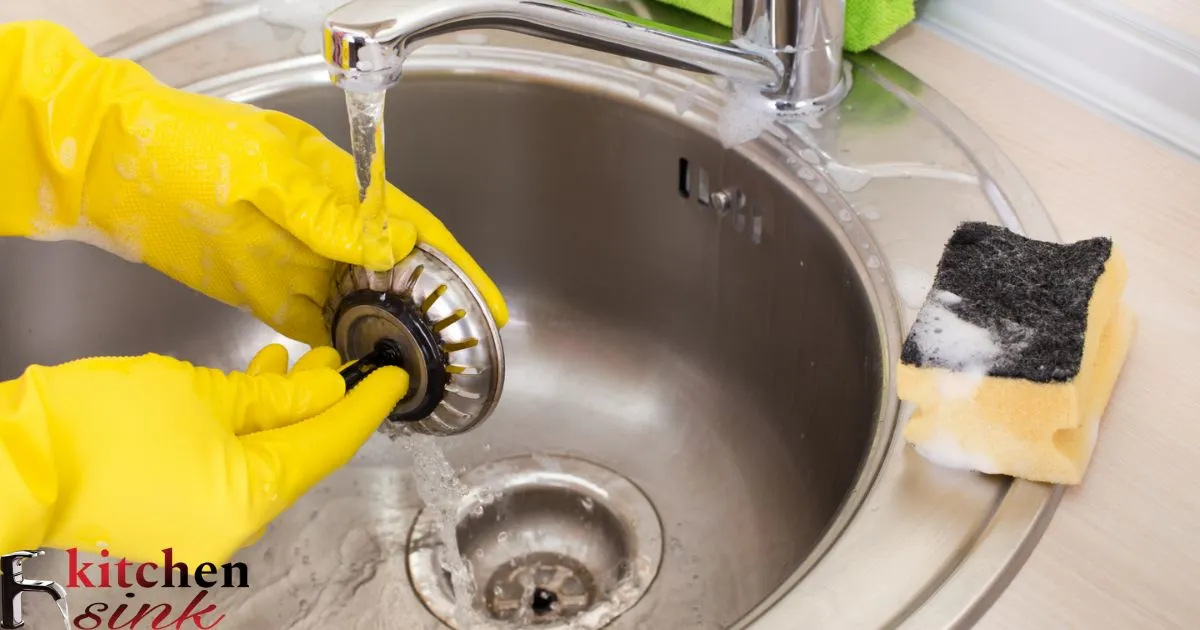A kitchen sink backs up when water and other material gets stuck in the drain pipes below the sink, preventing new water from flowing through normally. This causes the water already in the sink to rise up instead of draining out.
Have you ever wondered what could be causing your kitchen sink to suddenly back up? Frustrated with having to plunge the drain again and again to clear it out? Figuring out what is really going on beneath your sink is the first step to fixing the problem.
Common causes for a backed up kitchen sink drain include food scraps, grease, and hair getting lodged in the narrow pipes over time. Using harsh chemical drain cleaners may provide temporary relief but often causes additional buildup. The real solutions involve prevention through proper disposal of solid waste and occasional physical removal of any blockages in the drain traps and pipes.
Causes Kitchen Sink To Back Up
Small pieces of food, grease, or hair can get stuck in the p-trap under the sink and cause water to pool instead of draining normally. When too much builds up over time, it blocks the flow of water and causes it to back up in the sink.
Kitchen Sink Drain Slowly
Common reasons your kitchen sink may drain slowly include a buildup of food scraps, grease, or hair in the p-trap or drain pipes over time. This causes a clog that restricts the normal flow of water down the drain.
Common Items Cause Kitchen Sink Drains To Clog
Hair is a very common culprit that causes clogs. Food scraps like eggshells, coffee grounds, and vegetable peelings can also easily get stuck if they are washed down the drain. Grease and fatty food remnants tend to stick to pipe walls and accumulate.
Normal For Kitchen Sinks To Drain Slowly Sometimes
Yes, it’s normal for kitchen sink drainage to slow down every once in a while. Minor blockages from food particles or a buildup of grease can cause temporary slow draining. As long as a plunger or drain cleaner clears it, there’s usually no cause for concern.
Tell If It’s Time To Snake The Kitchen Sink Drain
Signs it may be time for a snake include water that drains very slowly or not at all. A foul odor coming from the drain can also indicate a serious clog. If drain cleaner doesn’t clear minor slowness within a few applications, it’s My Kitchen Sink Backing Up best to snake the line to remove a larger clog.
Signs Your Kitchen Sink Piper May Be Damaged
Leaking or standing water under the sink could mean cracked pipes that need repair. Strange noises like gurgling or clanking coming from the drain lines may signify damage as well. Physical deformation, corrosion, or rust spots on visible pipes could also point to needed replacement of piping.
What Can Get Stuck In My Kitchen Sink Drain?
Common culprits include food scraps and debris too large to clear like vegetable peels, eggshells, coffee grounds, onion skins, pasta, rice, and nuts. Hair is also a frequent offender as it wraps tightly around itself to form blockages.
Common Culprits That Clog Kitchen Sink Drains
5 common culprits that clog kitchen sink drains in short, easy to understand points
- Grease – Leftover oils and fats from cooking solidify and stick to pipe walls over time.
- Food scraps – Items like eggshells, potato peels, coffee grounds get stuck if washed down the drain.
- Hair – Stray hairs from washing hands or doing dishes wraps around itself and traps other debris.
- Soap scum – Excess soap and grime builds up inside drains and sewer lines.
- Food particles – Small bits of food like rice and pasta collect together to block pipes.
Foods Most Likely To Cause Kitchen Sink Drain Issues
Greasy or oily foods top the list as major drain-cloggers. Things like bacon grease, meat drippings, and baked-on coating from pans cause particular problems. Starchy items like potatoes, corn, pasta also tend to get stuck easily. Eggshells are surprisingly troublesome because of their shape and brittleness.
Grease Is Public Enemy #1 For Kitchen Sink Plumbing
Of all drain-clogging culprits, grease is generally the worst. It hardens and accumulates over time, sticking stubbornly to pipe surfaces. Even seemingly small amounts can wreak havoc on plumbing if not properly eliminated from kitchen wastewater. Using drain strainers and avoiding pouring grease down the drain are important preventative measures.
How Hair From The Bathroom Affects The Kitchen Sink
Hair that’s washed down the bathroom sink or shower can travel through shared drain lines and cause issues in the kitchen sink too. It’s very good at wrapping tightly around itself and trapping other debris to form clogs wherever it accumulates in the plumbing system. Regular drain cleaning helps prevent this.
How Do I Unclog A Blocked Kitchen Sink?
The first step is to remove any items blocking the drain. Use a plunger or drain snake tool inserted into the drain opening. Plunge up and down vigorously until the clog is cleared. Another option is to pour boiling water down the drain to help dissolve debris and grease blocking the flow. Allow the hot water to sit for 5-10 minutes before draining. Repeat if needed until draining is normal again.
Basic Tools Needed To Clear A Clogged Kitchen Sink Drain
The basic tools needed are a plunger, drain auger, boiling water, and drain cleaner solution. A plunger can help push clogs further down the pipe. A drain auger is a coiled wire attached to a handle that is inserted and twisted to break up clogs. Boiling water helps dissolve grease, food, and debris. Drain cleaner solution such as baking soda and vinegar can be poured into the drain and let sit before flushing with hot water.
Best Methods For Clearing Minor Kitchen Sink Drain Blockages
Using a plunger is often the best first step for minor clogs. Plunge up and down rhythmically to build pressure and dislodge the clog. If it doesn’t clear, pour 1/2 cup baking soda followed by 1/2 cup vinegar into the drain. Cover and let fizz for 5 minutes before flushing with hot water. For a heavier clog, use a drain auger snake that is inserted and twisted to break up the blockage further down in the p-trap.
When Should You Call A Plumber For A Clogged Kitchen Sink?
You should call a plumber if a clog cannot be cleared with a plunger, drain auger, or drain cleaner solutions. Signs include when drainage remains slow even after trying all methods or completely stops draining. A plumber has the right tools like a drain camera to see the problem location and professionally unclog built up issues deeper in the drain line.
Preventing Future Kitchen Sink Drain Clogs
To prevent future clogs, use a drain strainer in the sink to catch food waste and debris. Wipe up spills immediately and avoid pouring grease or oil down the drain. Run hot water through the drain weekly with a cup of baking soda to help dissolve residues that build up over time. Cut up or break down large food waste before washing down the disposal or sink basin.
What Happens If A Kitchen Sink Is Not Drained Properly?
If a kitchen sink is not drained properly, standing water can pool in the bottom of the basin. This is unsanitary and promotes bacteria growth. It also weakens the integrity of the sink material over time from the moisture exposure. Not draining fully allows more sediments and residues to build up in the P-trap trap and clog drains quicker in the future. Malodorous smells can develop in the sink as well.
Dangers Of Leaving Standing Water In The Kitchen Sink
| Danger | Description |
| Bacteria growth | Warm, wet conditions allow bacteria like E. coli to multiply quickly. |
| Unpleasant odors | Mold, mildew and germs cause foul smells as they grow in stagnant water. |
| Plumbing damage | Standing liquid weighs downpipes and can crack or warp them over time. |
| Insect/pest attraction | Mosquitoes and other bugs are drawn to standing water for breeding grounds. |
| Trip/fall hazard | Sinking into an empty but wet sink could cause slips or bangs in a busy kitchen. |
| Spread of germs | Contaminated water touching food/counters spreads illness through the home. |
| Appliance problems | Runoff seeps into electrical outlets/switches possibly causing shorts. |
Slow Drainage Can Damage Kitchen Sink Pipes
Slow drainage in a kitchen sink can damage sink pipes and plumbing over time if not addressed. When water does not fully drain away, it puts pressure on the P-trap underneath and any buildup of debris inside the drainage tubing. The extra weight increases strain. Sediment sitting in still water also causes more corrosion of metal pipes faster than normal flowing water. Cracks or leaks could develop requiring repair work.
Signs Your Kitchen Sink May Need Drain Cleaning Or Repair
Common signs include slow draining, gurgling or vibrating noises from the drain piping, standing water in the bottom of the sink, sink taking longer than normal to empty, and malodorous sewer smells. Other indications are if contents swirl rather than draining directly or debris comes up out of the drain when emptying water. You may also notice water backing up into the sink or nearby areas at times.
Consequences Of Long-Term Kitchen Sink Drain Problems
Long-term drain problems lead to other issues if not addressed. Clogs restrict proper flow and increase pressure in pipes, which can cause cracks and leaks over time damaging surrounding areas. Backups risk sewage flowing into nearby spaces posing health hazards.
Malodors spread throughout the home lowering air quality and aesthetic appeal. Drain flies and other pests may be attracted into living areas from standing water breeding bacteria. Plumbing repairs also become more extensive the longer drainage problems persist.
Can A Clogged Drain Cause A Kitchen Sink To Back Up?
Yes, a clogged drain is a common reason kitchen sinks experience backups. When debris, residues or other obstructions jam in the P-trap, drain pipe, or branch line, it prevents waste from exiting properly. This reduces flow capacity causing a backup that forces used water to rise up out of the drain opening or nearby fixtures instead of passing through. Clogs essentially act as dams that can no longer transport drainage volume through the system.
Common Reasons Behind A Backed-Up Kitchen Sink Drain
5 common reasons for a backed-up kitchen sink drain in short points
- Clogged pipe – Food scraps, grease, hair accumulat over time blocking the normal flow.
- Built-up grease – Leftover cooking oils and fats harden inside drains restricting drainage.
- Damaged pipes – Cracks or breaks cause standing water allowing more clogs to form.
- Tree roots – Intruding roots from nearby trees can grow inside old pipes.
- Improper disposal – Things like egg shells, coffee grounds, greasy foods are washed down.
Does Grease Really Cause Kitchen Sink Backups?
Grease is a leading cause of kitchen sink drain backups and clogs. While pouring small amounts of grease may seem harmless, it coats pipe interiors when cool. Over time, this builds up with other residues creating thick obstructions. Even paper towels used to absorb grease can clog small drain openings if flushed. It’s best to pour grease in sealed containers for disposal in the trash to avoid plumbing issues down the line.
Issue Is In The P-Trap Or Further Down
Signs the problem is in the P-trap under the sink include slow drainage improved by snaking or plunging the trap joint. If clearing the trap solves the backup, the issue was higher in the line. If clearing the trap provides no relief, the clog is likely further downstream in branch lines or the main soil stack. A plumber may camera inspect to locate where drainage stops or redirects inside walls and below floors.
Suspect The Main Drain Is Causing Kitchen Sink Backups
If multiple fixtures experience slower than normal drainage or full backups simultaneously, the main sewer or vent line feeding into the house is likely at fault rather than a single fixture drain. Tree roots intruding the main exterior line can inflict major damage over an extensive area of the plumbing system at once. Calling a plumber for camera diagnosis of the main drain is recommended if issues seem widespread.
Frequently Asked Question
What causes kitchen sink to back up?
Small particles or debris block the drain pipe preventing water from emptying.
Why does my kitchen sink drain slowly?
Buildup of food scraps, grease or hair restrict water flow over time within the pipes.
What are common items that cause kitchen sink drains to clog?
Hair, food scraps like eggshells or vegetables peelings, fatty residues from cooking.
Is it normal for kitchen sinks to drain slowly sometimes?
Minor and temporary slowness can occur from minor blockages but frequent issues likely mean a partial clog.
How can you tell if it’s time to snake the kitchen sink drain?
Signs include inability to drain at all, foul odors, or drain cleaner not clearing minor slowness within a few uses.
Conclusion
There are several common reasons why a kitchen sink may back up with water. Small food particles, hair, and greasy residues from cooking are typically the main culprits. Over time, a buildup of these items can partially or fully clog the drain pipes.
By practicing preventative maintenance like cleaning drain traps regularly, using strainers, and avoiding putting greasy food down the sink, homeowners can help reduce the risk of back ups occurring. If minor issues with slow draining persist, it may be time to use a drain snake to remove any debris or buildup obstructing normal water flow. Addressing the cause can allow the sink to drain properly once again.



